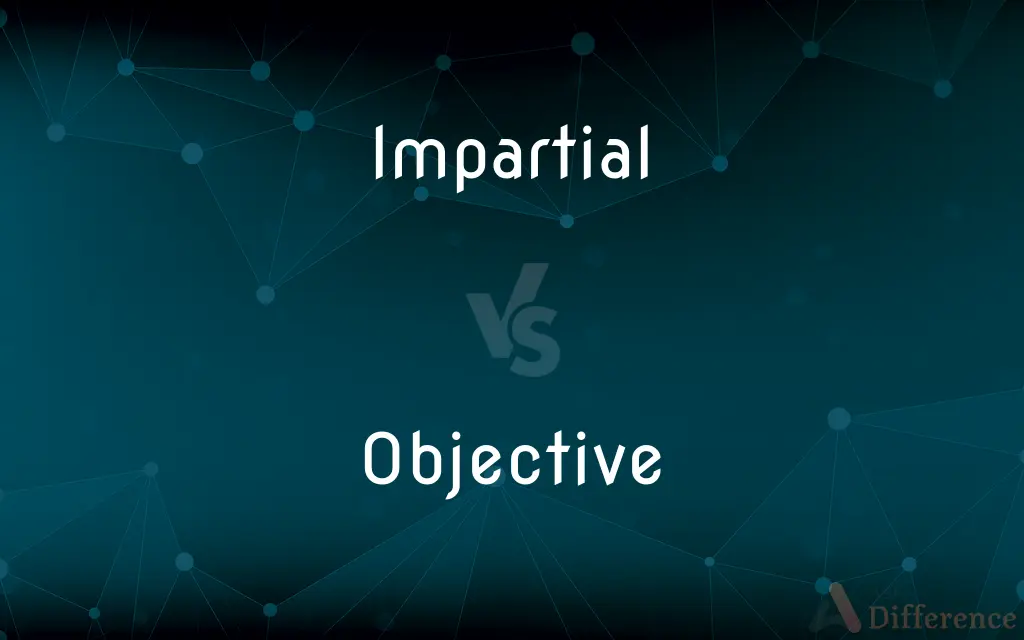Impartial vs. Objective — What's the Difference?
By Fiza Rafique & Maham Liaqat — Updated on March 27, 2024
Impartiality refers to fairness and lack of bias, especially in judgment, while objectivity involves basing opinions or decisions on facts without influence from personal feelings or prejudices.

Difference Between Impartial and Objective
Table of Contents
ADVERTISEMENT
Key Differences
Impartiality is primarily concerned with fairness and equality, emphasizing an even-handed approach that does not favor one side over another. It is crucial in contexts where fairness is paramount, such as in legal proceedings or when mediating disputes. Objectivity, on the other hand, stresses the importance of grounding decisions and opinions in factual evidence and logical reasoning, aiming to minimize the impact of personal bias or emotions.
An impartial person consciously avoids letting personal relationships, preferences, or biases influence their judgment or actions. This is particularly important in roles such as a judge or arbitrator, where the expectation is to treat all parties with equal fairness and respect, regardless of personal feelings. Conversely, someone who is objective focuses on analyzing and interpreting information in a way that is not distorted by personal feelings or subjective interpretations. This quality is vital in scientific research, journalism, and any field where truth and accuracy are paramount.
Impartiality is essential in ensuring that decisions are made fairly and are seen to be fair by all involved parties. It builds trust and credibility, especially in situations where the decision-maker has power over outcomes that significantly affect people's lives. Objectivity contributes to credibility as well but does so through rigorous adherence to facts and evidence, ensuring that conclusions are valid and reliable regardless of the observer's identity.
While impartiality aims to achieve fairness by treating all parties equally without prejudice, objectivity seeks to attain truth and accuracy by removing personal bias from the evaluation of information. Both are crucial in maintaining integrity and trust in various professional and social contexts, but they operate on slightly different principles. An impartial judge might seek to ensure a fair trial, while an objective scientist aims to reach conclusions supported by data, regardless of personal belief or societal expectations.
In practice, both impartiality and objectivity are ideals that individuals and institutions strive to achieve. Challenges arise due to the inherent biases and subjectivities that people bring to their roles. However, the conscious effort to be impartial or objective can significantly impact the fairness and reliability of decisions and information.
ADVERTISEMENT
Comparison Chart
Focus
Fairness and lack of bias
Fact-based decisions without personal bias
Key Contexts
Legal judgments, dispute resolution
Scientific research, journalism
Importance
Ensures decisions are fair and seen as fair
Ensures conclusions are valid and reliable
Goal
Equality and fairness among all parties
Truth and accuracy based on facts
Challenges
Overcoming personal biases
Distancing personal feelings from analysis
Compare with Definitions
Impartial
Equitable in treatment of all sides.
The committee promised an impartial investigation of the incident.
Objective
Not influenced by personal feelings or opinions in considering facts.
His objective analysis was crucial for the study.
Impartial
Treating all rivals or disputants equally.
An impartial mediator facilitated the negotiation.
Objective
Unbiased, especially in the evaluation of arguments.
An objective viewpoint helps in resolving conflicts.
Impartial
Not influenced by personal feelings in considering facts.
She reviewed the applications in an impartial manner.
Objective
Exhibiting fairness by sticking to observable facts.
Objective journalism is essential for democracy.
Impartial
Free from bias or favoritism in judgment.
The umpire is known for his impartial decisions during games.
Objective
Based on observable phenomena and uninfluenced by emotions.
The report aims to be objective and fact-based.
Impartial
Neutral and unbiased in perspective.
Impartial advice is valued in sensitive situations.
Objective
Fact-oriented decision making.
Objective criteria were used to evaluate the submissions.
Impartial
Treating all rivals or disputants equally
The minister cannot be impartial in the way that a judge would be
Objective
Existing independent of or external to the mind; actual or real
Objective reality.
Impartial
Not partial or biased; unprejudiced.
Objective
Based on observable phenomena; empirical
Objective facts.
Impartial
Treating all parties, rivals, or disputants equally; not partial; not biased
Objective
Uninfluenced by emotions or personal prejudices
An objective critic.
Impartial
Not partial; not favoring one more than another; treating all alike; unprejudiced; unbiased; disinterested; equitable; fair; just.
Jove is impartial, and to both the same.
A comprehensive and impartial view.
Objective
A thing or group of things existing independent of the mind.
Impartial
Showing lack of favoritism;
The cold neutrality of an impartial judge
Objective
The objective case.
Impartial
Free from undue bias or preconceived opinions;
An unprejudiced appraisal of the pros and cons
The impartial eye of a scientist
Objective
A noun or pronoun in the objective case.
Objective
The primary optical element, such as a lens or mirror, in a microscope, camera, telescope, or other optical instrument, that first receives light rays from the object and forms the image. Also called object glass, objective lens, object lens.
Objective
Of or relating to a material object, actual existence or reality.
Objective
Not influenced by the emotions or prejudices.
Objective
Based on observed facts; without subjective assessment.
Objective
(grammar) Of, or relating to a noun or pronoun used as the object of a verb.
Objective
Of, or relating to verbal conjugation that indicates the object (patient) of an action. In linguistic descriptions of Tundra Nenets, among others.
Objective
A material object that physically exists.
Objective
A goal that is striven for.
Objective
(grammar) The objective case.
Objective
(grammar) a noun or pronoun in the objective case.
Objective
The lens or lenses of a camera, microscope, or other optical device closest to the object being examined.
Objective
Of or pertaining to an object.
Objective
Of or pertaining to an object; contained in, or having the nature or position of, an object; outward; external; extrinsic; - an epithet applied to whatever is exterior to the mind, or which is simply an object of thought or feeling, as opposed to being related to thoughts of feelings, and opposed to subjective.
In the Middle Ages, subject meant substance, and has this sense in Descartes and Spinoza: sometimes, also, in Reid. Subjective is used by William of Occam to denote that which exists independent of mind; objective, what is formed by the mind. This shows what is meant by realitas objectiva in Descartes. Kant and Fichte have inverted the meanings. Subject, with them, is the mind which knows; object, that which is known; subjective, the varying conditions of the knowing mind; objective, that which is in the constant nature of the thing known.
Objective has come to mean that which has independent existence or authority, apart from our experience or thought. Thus, moral law is said to have objective authority, that is, authority belonging to itself, and not drawn from anything in our nature.
Objective
Unbiased; unprejudiced; fair; uninfluenced by personal feelings or personal interests; considering only the facts of a situation unrelated to the observer; - of judgments, opinions, evaluations, conclusions, reasoning processes.
Objective means that which belongs to, or proceeds from, the object known, and not from the subject knowing, and thus denotes what is real, in opposition to that which is ideal - what exists in nature, in contrast to what exists merely in the thought of the individual.
Objective
The objective case.
Objective
The goal intended to be attained (and which is believed to be attainable);
The sole object of her trip was to see her children
Objective
The lens or system of lenses nearest the object being viewed
Objective
Undistorted by emotion or personal bias; based on observable phenomena;
An objective appraisal
Objective evidence
Objective
Serving as or indicating the object of a verb or of certain prepositions and used for certain other purposes;
Objective case
Accusative endings
Objective
Emphasizing or expressing things as perceived without distortion of personal feelings or interpretation;
Objective art
Objective
Belonging to immediate experience of actual things or events;
Concrete benefits
A concrete example
There is no objective evidence of anything of the kind
Common Curiosities
How does objectivity affect decision-making?
Objectivity improves decision-making by ensuring that conclusions and actions are based on factual evidence and logical reasoning, free from personal bias.
Can a person be impartial but not objective?
Yes, a person can be impartial by treating all sides equally but might not be objective if their method of judgment is influenced by non-factual beliefs or assumptions.
Why is impartiality important in legal systems?
Impartiality is crucial in legal systems to ensure that all individuals receive fair treatment and that justice is administered without prejudice.
What role does impartiality play in ethical dilemmas?
In ethical dilemmas, impartiality helps ensure that decisions are fair and equitable, considering the well-being of all parties without favoritism.
What does being impartial mean?
Being impartial means not showing favoritism or bias towards any side or individual, ensuring fairness and equality in judgment or treatment.
How do journalists maintain objectivity?
Journalists maintain objectivity by reporting facts without letting personal opinions influence the presentation of news, ensuring accurate and unbiased information.
How can one improve their impartiality?
Improving impartiality involves recognizing personal biases, actively seeking diverse perspectives, and committing to fairness in judgment and actions.
What is the importance of objectivity in academic research?
Objectivity is vital in academic research to ensure that findings and conclusions are based on empirical evidence and logical analysis, contributing to the reliability of knowledge.
What distinguishes objectivity in science?
In science, objectivity is distinguished by methodologies that minimize bias, such as peer review, replication of results, and basing conclusions on empirical evidence.
Can organizational policies ensure impartiality?
Organizational policies can promote impartiality by establishing clear guidelines for fairness, transparency, and accountability in decisions and actions.
How do impartiality and objectivity contribute to trust?
Impartiality and objectivity build trust by ensuring that decisions and information are fair, reliable, and free from undue influence, fostering confidence in outcomes.
Is it possible to achieve complete objectivity?
While complete objectivity is challenging due to inherent personal biases, striving for it through methodologies and checks can significantly reduce subjective influence.
How does culture affect perceptions of impartiality and objectivity?
Cultural values and norms can influence perceptions of what is considered impartial or objective, with different societies placing varying emphasis on these ideals.
Can technology help achieve impartiality and objectivity?
Technology can aid in achieving impartiality and objectivity by providing tools for unbiased data analysis and facilitating transparency in decision-making processes.
What challenges do institutions face in upholding impartiality and objectivity?
Institutions face challenges such as inherent biases, external pressures, and conflicting interests that can hinder the consistent application of impartiality and objectivity.
Share Your Discovery

Previous Comparison
Jujube vs. Date
Next Comparison
Matriculate vs. GraduateAuthor Spotlight
Written by
Fiza RafiqueFiza Rafique is a skilled content writer at AskDifference.com, where she meticulously refines and enhances written pieces. Drawing from her vast editorial expertise, Fiza ensures clarity, accuracy, and precision in every article. Passionate about language, she continually seeks to elevate the quality of content for readers worldwide.
Co-written by
Maham Liaqat












































